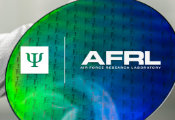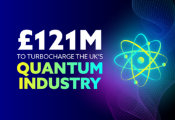Zuchongzhi-3 Sets New Benchmark With 105-Qubit Superconducting Quantum Processor
Zuchongzhi-3 Sets New Benchmark With 105-Qubit Superconducting Quantum Processor
A team of researchers from the University of Science and Technology of China (USTC) of the Chinese Academy of Sciences and its partners have made significant advancements in random quantum circuit sampling with Zuchongzhi-3, a superconducting quantum computing prototype featuring 105 qubits and 182 couplers. Operating at a speed 10¹⁵ times faster than the most powerful supercomputer currently available and one million times faster than Google's latest published results, the achievement marks a major milestone in quantum computing and follows the success of its predecessor, Zuchongzhi-2.
New System Boosts Efficiency of Quantum Error Correction
New System Boosts Efficiency of Quantum Error Correction
Now, a team of scientists led by researchers at the Pritzker School of Molecular Engineering (PME) at the University of Chicago have developed the blueprint for a quantum computer that can more efficiently correct errors. The system uses a new framework, based around quantum low-density party-check (qLDPC) codes — which can detect errors by looking at the relationship between bits — as well as a new hardware involving reconfigurable atom arrays, which allow qubits to communicate with more neighbors and therefore let the qLDPC data be encoded in fewer qubits.
Quantum Computing, but Better
Quantum Computing, but Better
Researchers from NTT, the University of Tokyo, RIKEN, and Kyushu University have created a new quantum computing architecture which separates memory from processing to improve efficiency.
Rigetti Computing Selected to Participate in DARPA’s Quantum Benchmarking Initiative
Rigetti Computing Selected to Participate in DARPA’s Quantum Benchmarking Initiative
Rigetti Computing, Inc. (“Rigetti” or the “Company”), a pioneer in full-stack quantum-classical computing, announced today that it was selected to participate in the Defense Advanced Research Projects Agency (DARPA) Quantum Benchmarking Initiative (QBI). The primary goal of QBI is to determine if any approach to quantum computing can achieve utility-scale operation by 2033. QBI will use a multi-stage approach, Stages A, B, and C, to assess the proposed concepts, with each stage representing an increased level of scrutiny. Rigetti will advance to Stage A, a 6-month performance period focused on the Company’s utility-scale quantum computer concept worth up to $1 million upon completion of program milestones.
Howard University Physicist Revisits the Computational Limits of Life and Schrödinger’s Essential Question in the Era of Quantum Computing
Howard University Physicist Revisits the Computational Limits of Life and Schrödinger’s Essential Question in the Era of Quantum Computing
Philip Kurian, a theoretical physicist and founding director of the Quantum Biology Laboratory (QBL) at Howard University in Washington, D.C., has used the laws of quantum mechanics, which Schrödinger postulated, and the QBL’s discovery of cytoskeletal filaments exhibiting quantum optical features, to set a drastically revised upper bound on the computational capacity of carbon-based life in the entire history of Earth. Published in Science Advances, Kurian’s latest work conjectures a relationship between this information-processing limit and that of all matter in the observable universe.
Iceberg Quantum Launches With $2M and PsiQuantum Partnership
Iceberg Quantum Launches With $2M and PsiQuantum Partnership
Iceberg Quantum today announced its launch, a $2 million pre-seed funding round, and a partnership with PsiQuantum. The company is developing fault-tolerant quantum computing architectures based on LDPC codes, with the goal of accelerating the path to useful quantum computing using significantly less hardware.
Plug-and-Play Quantum Error Correction Development: QuantrolOx and QuantWare Introduce Quantum EDGE Development Kit for Contralto-A
Plug-and-Play Quantum Error Correction Development: QuantrolOx and QuantWare Introduce Quantum EDGE Development Kit for Contralto-A
QuantWare and QuantrolOx have announced a joint offering enabling quantum computer researchers to develop error correction capabilities using QuantWare’s flagship error-correction Contralto-A quantum processor with the automated tuneup of QuantrolOx’s Quantum EDGE software.
Introducing Contralto-A: A QPU for Quantum Error Correction
Introducing Contralto-A: A QPU for Quantum Error Correction
QuantWare, a global leader in quantum hardware scaling technologies, today revealed Contralto-A: a new Quantum Processor Unit (QPU) with complementary offering designed to meet the requirements of its customers wanting to scale their quantum error-correction capabilities.
Photonic Accelerates the Timeline to Useful Quantum Computing With Breakthrough Results in Error Correction
Photonic Accelerates the Timeline to Useful Quantum Computing With Breakthrough Results in Error Correction
In an industry first, Photonic Inc. has introduced a new, low-overhead family of Quantum Low-Density Parity Check (QLDPC) codes that can efficiently perform both quantum computation and error correction, using materially fewer quantum bits (qubits) than traditional surface code approaches. This milestone work will accelerate the timeline to useful quantum computing.
Distributed Quantum Error Correction: Theory Breakthrough From Nu Quantum Charts Pathway for Quantum Computing Scale-Out
Distributed Quantum Error Correction: Theory Breakthrough From Nu Quantum Charts Pathway for Quantum Computing Scale-Out
Nu Quantum releases a Quantum Error Correction (QEC) theory paper demonstrating how a modular quantum computing architecture of interconnected processors is compatible with high-rate and efficient quantum error correction codes, charting a path towards fault-tolerant distributed quantum computing.


























